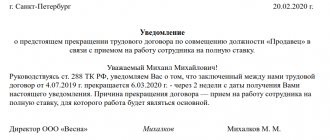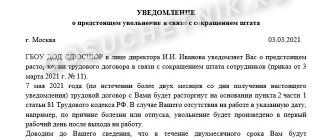The Labor Code of the Russian Federation (hereinafter referred to as the Labor Code of the Russian Federation) does not contain the concept of “forced dismissal”. However, as practice shows, employees often use it to prove the illegality of the employer’s actions, forcing the employee to write a statement of his own free will or to terminate the employment contract by agreement of the parties.
The general grounds for termination of an employment contract are contained in Art. 77 Labor Code of the Russian Federation. The reasons for termination of an employment contract are most often the agreement of the parties (Article 78 of the Labor Code of the Russian Federation), termination of the employment contract at the initiative of the employee (Article 80 of the Labor Code of the Russian Federation) and the employer (Articles 71 and 81 of the Labor Code of the Russian Federation).
Let us consider the emerging issues using examples from practice related to the termination of an employment contract “under duress.”
The concept of forced dismissal and its forms
Forced resignation can be understood as the actions of the employer, which must force the employee to write a statement “of his own free will” or to resign by agreement of the parties.
Employers often resort to this measure of dismissal for various reasons:
- personal hostility of the manager towards the subordinate;
- lack of money to pay wages;
— in order to avoid a reduction in the number or staff of employees;
— intention to vacate the position for the “best/your” candidate;
- so as not to be fired under the article, etc.
In order to force dismissal, the head of the organization (or another person authorized by him) resorts to illegal forms of influence on the employee. As practice shows, these forms most often are:
What will serve as evidence of coercion?
You can sue an employer within a month from the date of dismissal. Not everything can serve as evidence in court. If you intend to sue your employer, you will have to take care of the evidence base:
- maximum documentation (for example, if you need time off, you should not rely on verbal permission, but submit a written request and receive it);
- video and audio recordings (their authenticity must be proven);
- witness statements.
FOR YOUR INFORMATION! The only almost indisputable evidence of forced resignation is the hiring of another employee on the day the plaintiff wrote the application: with a “real” dismissal in such a short period of time, it is unlikely that the right specialist will be found.
Threat of dismissal under article
Employers most often choose this method of putting pressure on an employee.
Here it is important to distinguish whether the employee really improperly performs his job duties, violates the work schedule at this enterprise, or whether this is solely the employer’s desire to get rid of him quickly.
In the first case, a violation on the part of the employer will most likely not be considered by the courts.
Arbitrage practice:
The employee appealed the termination of her employment relationship at her own request (clause 3, part 1, article 77 of the Labor Code of the Russian Federation), indicating that the manager forced her to write a statement, threatening to fire her for showing up at work while intoxicated.
The court refused to satisfy the plaintiff's claims because it concluded that she wrote the statement of her own free will.
She understood that the employer had claims against her and could fire her for a single gross violation of labor discipline.
This circumstance cannot be considered pressure on the part of the employer, since he provided her with the opportunity to avoid disciplinary liability for committing a disciplinary offense and choose a more favorable basis for terminating the employment contract from the point of view of legal consequences (Decision of the Kushvinsky City Court of the Sverdlovsk Region dated April 14, 2017 No. 2 -306/2017).
If the threat of dismissal under the article is the arbitrariness of the employer and is not supported by anything, and the employee can prove this in court, then the employer will be forced to reinstate the dismissed employee at work, pay the average salary for the period of forced absence, compensate for moral damages and legal costs.
If this fact is established by the State Labor Inspectorate during an inspection, the employer will be held administratively liable and will be required to reinstate the employee at work.
Arbitrage practice:
The plaintiff filed a statement of claim in court, in which he asked to recognize the dismissal as illegal and forced, since he wrote a letter of resignation of his own free will under pressure from management.
The next day, he wrote a statement about withdrawing his resignation of his own free will and, due to the weekend, sent it by registered mail to the employer.
Despite this, the employer still fired him under clause 3, part 1, art. 77 of the Labor Code of the Russian Federation (at your own request).
Due to the fact that the plaintiff did not intend to quit, he asked the court to reinstate him at work, recover his average earnings for the period of forced absence and compensate for moral damages.
The court considered the plaintiff’s arguments worthy of attention and satisfied the claims regarding the employee’s reinstatement at work, payment of average earnings for the period of forced absence, and compensation for moral damage.
The court noted that psychological pressure was exerted on the plaintiff by management and threats were made about dismissal on defamatory grounds. This was confirmed by an order imposing a disciplinary sanction in the form of a reprimand and deprivation of a bonus, as well as a copy of the order without a date or number, according to which the plaintiff was reprimanded and deprived of a bonus for violating internal labor regulations (Decision of the Kirovo-Chepetsky District Court of the Kirov Region dated 06/09. 2016 N 2-1817/2016).
What to do if you are forced to leave
The first thing to decide in such cases is whether you really need the job. If they so clearly don’t want to see you there, is it worth spending precious time and effort on this workplace? If you are ready to give in, we can recommend protecting your interests as much as possible:
- resolve issues with the employer regarding the period and conditions of voluntary resignation;
- write a statement not of your own free will, but by agreement of the parties, stipulating the payment of severance pay and compensation.
If the decision is made to fight, then the advice will be as follows:
- voice your position to the employer: you know that they want you to “survive”, but you do not intend to give up;
- under no circumstances write or sign any documents about dismissal; make it a rule to carefully read all signed documents;
- scrupulously observe labor discipline and internal regulations;
- record all controversial issues in writing;
- do not give in to provocations;
- be prepared for unpleasant surprises (for example, not being allowed to work due to a medical examination not completed on time, an overly biased safety check, a truant taking time off that was formalized only in words, etc.).
Pressure from the employer
Most often, pressure is understood as a mental impact on an employee, creating unbearable conditions for him to continue working.
Here it is important to distinguish when the influence on an employee comes from the head of the organization himself, and when it is exerted by “unauthorized” employees of the organization. In the second case, such actions will not be recognized as pressure.
Let us note that it is very difficult to prove pressure from the employer to an employee in court.
As a rule, the employee takes care of the evidence base in advance (for example, he collects written evidence that expresses threats from the employer or contains requirements for filing an application of his own free will, witness testimony, audio and video recordings).
In any case, the employee must prove that it was impossible to resist psychological pressure from management.
Arbitrage practice:
An employee dismissed under clause 3, part 1, art. 77 of the Labor Code of the Russian Federation, filed a lawsuit for reinstatement at work, recovery of average earnings for the period of forced absence, and compensation for moral damage.
According to her, the resignation letter was written under pressure from the deputy director.
During the trial, arguments about the forced nature of the dismissal were not confirmed. In this regard, the court came to the conclusion that the plaintiff had a valid expression of will to terminate the employment relationship at his own request.
The claim was rejected (Decision of the Neklinovsky District Court of the Rostov Region dated November 13, 2015 in case No. 2-1826/2015).
As an additional method of dismissal, employers extremely rarely use forcing an employee to resign at his own request or by agreement of the parties under the threat of disseminating information that discredits the honor and dignity of the employee, as well as causing harm to the life, health or property of the employee. The latter method of influence is not only unlawful on the part of the employer, but also criminally punishable.
It's easier to force, it's hard to prove
Legal practice suggests that coercive employers often get away with impunity. There are several reasons for this:
- The offended party cannot prove duress. Often conversations about dismissal occur unexpectedly for an unwanted employee. As a rule, the employer makes sure that they take place without witnesses. Even if you press the record button on your phone in time, it will not be legal evidence for the court.
- Positive test result. If an organization receives an inspection from the prosecutor's office or labor inspectorate, this does not mean that it will be able to establish the fact of coercion, because it leaves no traces.
- The prosecutor's office will only “wag its finger.” Even if you complain to the prosecutor’s office and it takes the complaint seriously, all that it can do to the employer until the dismissal takes place is to issue a “warning” - simply a speculative measure that does not carry any legal consequences. A dismissal that has already taken place can only be challenged in court.
- “They didn’t know what they were doing.” Due to legal ignorance, many workers do not even realize that their rights are being violated.
ATTENTION! For more timid employees, the phrase “You are fired, write a statement!” is often enough. The image of an all-powerful boss is often shown in movies, so such a dismissal may seem legitimate to the average person.
Inability to revoke the agreement
According to Part 4 of Art. 80 of the Labor Code of the Russian Federation, an employee may withdraw his application for dismissal before the expiration of the notice period for dismissal. In fact, at any time until he was allowed to familiarize himself with the dismissal order and was given a work book with a paycheck. But in the case of signing an agreement between the parties on dismissal, he, as a general rule, will not be able to do this.
None of the employees, with the exception of pregnant women, can also unilaterally refuse to fulfill the agreement.
This conclusion follows from the Rulings of the Supreme Court of the Russian Federation dated 06/20/2016 N 18-KG16-45 and 09/05/2014 N 37-KG14-4, which state that the guarantee in the form of a ban on dismissal of a pregnant woman at the initiative of the employer, provided for in Part 1 of Art. . 261 of the Labor Code of the Russian Federation, is also applicable to relations arising upon termination of an employment contract by agreement of the parties. Moreover, this rule also applies if the employee did not know about her pregnancy at the time of signing the agreement.
If at the time of cancellation of the agreement the employer had already issued a dismissal order, it must be canceled by another order.
Good aspects of the agreement between the parties for the employee
A resigning employee should consider the agreement of the parties as a reason for dismissal, because:
- the application can be submitted at any time during the term of the employment contract;
- the reason for leaving is not required in the application;
- the moment of leaving is discussed with the employer, there is no mandatory service;
- you can agree with the employer on the conditions of care – terms, compensation, etc.;
- neutral entry in the work book;
- an excellent alternative in case of threat of dismissal for guilty behavior;
- the length of service is not interrupted for another month after leaving on this basis;
- When registering with the Employment Center, the benefit will be higher.
Is it possible to terminate an employment contract with an employee by agreement of the parties while the employee is on vacation ?
Step by step registration procedure
Now we will consider the procedure for dismissing an employee by agreement of the parties step by step.
First stage
It is necessary to follow a certain algorithm of actions: first, you must put the agreement reached that the employee is leaving by mutual agreement in writing. When drawing up the document, the participation of the employee himself is allowed; he has the opportunity to offer more favorable conditions, including payment of compensation and its exact amount. It is advisable to indicate the following details in the agreement:
- the reason for the decision to terminate cooperation is termination of the contract by mutual agreement;
- date of termination of the relationship, last working day;
- conditions;
- signatures confirming the expression of will.
Since the specific form is not approved by law, a written agreement is acceptable in the form:
- employee statements with the manager’s resolution;
- a separate document, agreement, in two copies.
Example of a written agreement to terminate an employment contract
Second phase
Registration of an agreement to terminate a contract by agreement of the parties or an employee’s application in the manner established in the employer’s records management, for example, in a special journal, delivery of the agreement to the employee against signature. It is recommended to indicate specifically that the copy was received in person.
Third stage
Issuance of the corresponding order. To compile it, there is a unified form T-8. Clause 1 of Art. is indicated as the basis for termination of the contract. 77 of the Labor Code of the Russian Federation, since it provides a general list of grounds for termination of a contract. And already in the line “Bases” - a document expressing the will of the employer and employee. The employee gets acquainted with the order and signs it.
Fourth stage
Calculation in the accounting department with obtaining the necessary certificates.
Fifth stage
Next, an entry is made into the labor record by agreement of the parties in 2020. Registration of the transfer of the work book with confirmation of receipt of the document in the form of the employee’s signature in a special journal.
The grounds for dismissal are given in full, the wording exactly corresponds to the text of the law, and Art. 77 Labor Code of the Russian Federation. The entry is certified by the responsible employee and sealed, the employee himself signs and receives the document in hand.
The exact wording in the work book upon dismissal on this basis: “The employment contract is terminated by agreement of the parties, paragraph 1 of part one of Article 77 of the Labor Code of the Russian Federation.” Instead of “employment contract terminated,” it is permissible to write “dismissed.”
Of course, the employee is interested in what is paid upon dismissal by agreement of the parties. Full payment upon dismissal is required.









